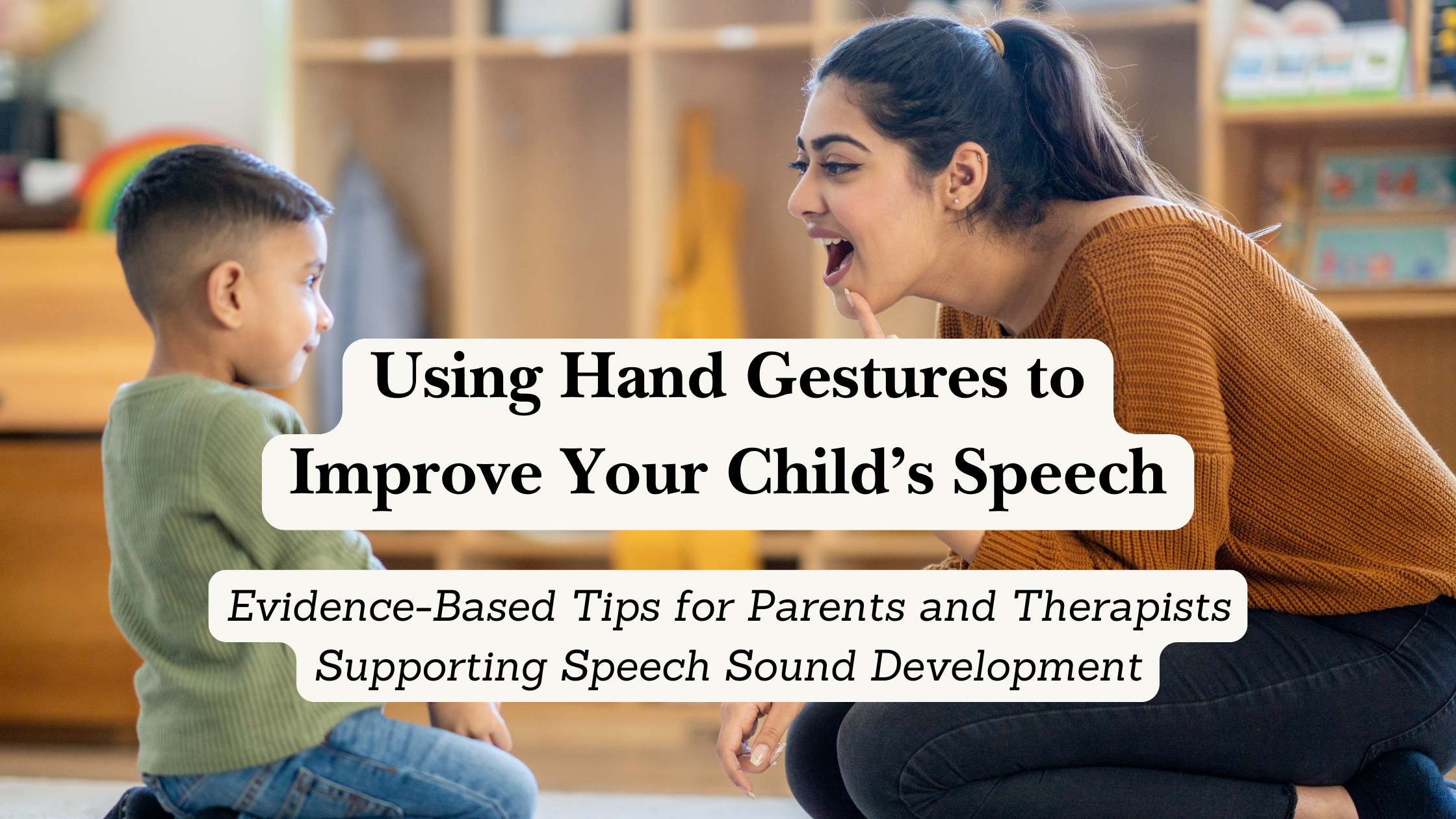
Using Hand Gestures to Improve Your Child’s Speech
Helping children improve their speech can feel overwhelming, but simple strategies like hand gestures and gaining their visual attention can make a big difference. Research shows that pairing speech sounds with visual and tactile cues not only makes learning more engaging but also helps kids produce sounds more accurately. In this post, we’ll explore how to use gestures effectively, why visual attention is crucial, and practical tips to support your child’s speech development. Whether you’re a parent or therapist, these evidence-based techniques can transform the way you approach speech practice!

The Power of Play - It’s More Than Just Toys
When it comes to supporting language development, the best toys are tools—but the true magic happens through the connection and interaction with a play partner. Research shows that responsive back-and-forth exchanges, known as serve-and-return interactions, are essential for building the brain connections that support communication. Intentional play strategies, like following your child’s lead, modeling language, and asking open-ended questions, turn everyday moments into opportunities for growth. Toys may set the stage, but it’s the connection, guidance, and shared joy that truly foster language learning.

Toys With Purpose: Your Ultimate Holiday Gift Guide
Toys With Purpose: More Than a Gift Guide
This holiday season, go beyond just gift-giving—choose toys that make a difference. My Holiday Gift Guide, Toys With Purpose is more than a shopping list; it’s a carefully curated collection of toys designed to enhance your child’s development. As a licensed SLP and mom of two, this guide is packed with expert-approved recommendations that spark joy while promoting critical skills like speech, language, fine motor skills, coordination, problem-solving, and social skills. These toys aren’t just for play—they’re tools that support growth, learning, and meaningful connections.

Understanding Sensory Differences in Autistic Children
Understanding Sensory Differences in Autistic Children and Their Impact on Speech Therapy
Sensory differences play a crucial role in the lives of autistic children, affecting their emotional well-being, attention, and communication skills. Research shows that 74% of autistic children exhibit sensory processing challenges, which can significantly impact their speech development and participation in speech therapy. By recognizing how hypersensitivity and hyposensitivity to sensory inputs influence behavior, parents and caregivers can create a more supportive environment for effective communication. Discover practical strategies to adapt therapy settings and foster self-awareness in your child, helping them thrive in their speech and language journey.

Enriching Your Child’s Speech and Language Skills through Play and Experiences
Discover how to enrich your child's speech and language skills through everyday adventures and real-life experiences. Forget the flashcards and workbooks—learn how descriptive language, fun activities, and play can boost cognitive growth and vocabulary. Turn simple outings into exceptional learning opportunities and watch your child thrive!

How to Recognize the Early Signs of Speech and Language Delays
Early recognition of potential delays can be crucial for a child’s development. Learn about typical developmental milestones, the early signs of speech and language delays, and when to seek professional help with speech therapy. This guide will empower you with the knowledge to understand your child's development and to know when initiating speech therapy for your child may be beneficial. Don't wait—early intervention can change your child’s developmental path!

How Long Will It Take to “Fix” My Child’s Speech?
One of the most common questions parents have is “How long will it take to fix my child’s speech?” or "How long will my child need speech therapy?” There’s no straightforward answer for this, let’s talk about why! Learn about the process of speech production, understand why your speech therapist doesn’t know exactly how long your child will be in speech therapy, and understand what you can do to help your child’s speech at home!

Why Teaching Your Child Sign Language is a Game-Changer
Learn how sign language can boost communication abilities, enhance cognitive and language development, and improve social-emotional skills. This article highlights the role of sign language in speech therapy and child development, offering practical tips to help your child talk and strengthen your bond. Using signs can support your child's growth... and as an added bonus, have fun learning together!


My Child Isn’t Talking… What Do I Do?
In the world of child development, milestones are often seen as the gold standard for gauging progress. But what happens when your child isn't hitting those expected markers? It's crucial to understand that speech delay can be influenced by a multitude of factors beyond simple milestones. From neurodivergence to prematurity, genetic conditions to environmental influences, there's a complex interplay at work. As a parent, trusting your instincts is paramount. Early intervention, such as speech therapy and AAC, can be pivotal in nurturing your child's unique path to communication proficiency.

How Many Words Should My Child Say?
Discover key language development milestones for children ages 1-3. Learn how many words your child should say by age 1, 18 months, 2 years, and 3 years, and get tips on supporting their language growth. Answer questions like: How many words should my child say? Does my child need speech therapy? Is my child delayed? And learn how to take action early!

Embracing Neurodiversity: Understanding and Incorporating Neurodiversity-Friendly Practices
What is neurodiversity? Why is it important? And what can I do to better accept and support neurodivergent people? Read more here!

Why Early Intervention for Speech Therapy is Crucial: Benefits of Starting Treatment Early
Providing early intervention with speech therapy can positively influence your child’s future, and for those that will not naturally catch up on their own, it can make a world of a difference in their development.

Ten Proven Strategies to Enhance Your Toddler’s Language Development
As a parent, there are so many things you can do to influence and encourage your child's language learning journey. Here we share ten effective tips designed to foster and amplify your little one’s language skills during these crucial early years.

How Do I Know If My Child Needs Speech Therapy?
Speech and language skills are crucial for communication and learning. Sometimes, children may need a little extra support, and recognizing the signs early on can make a big difference. If you notice your child struggling or falling behind in meeting their milestones, it’s a good idea to reach out to a professional to see if your child may benefit from an evaluation.

